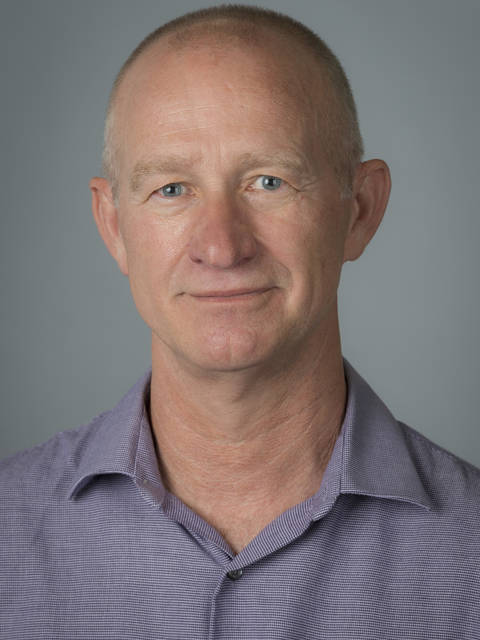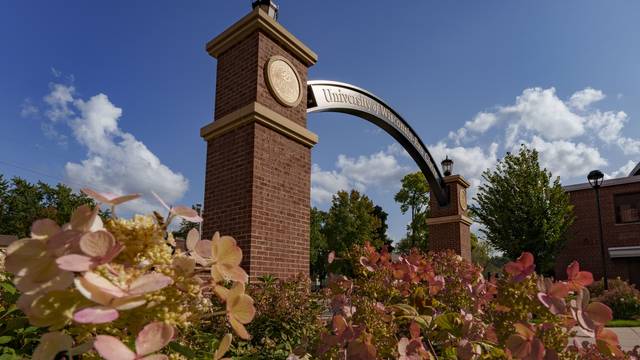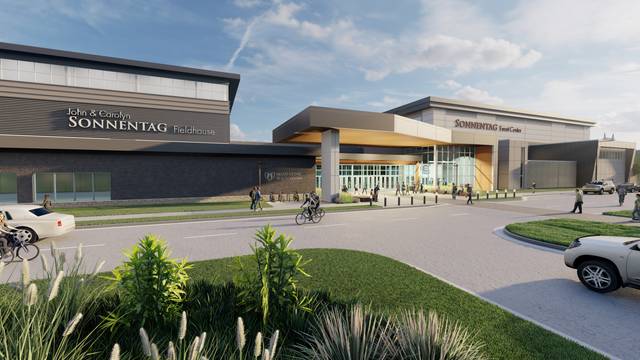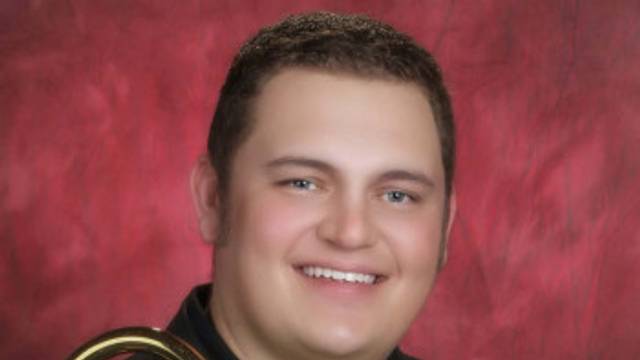Photo caption: This rendering of the Sonnentag Event Center and Field House shows the setting along the Chippewa River a, mile west of the main UW-Eau Claire campus.
The University of Wisconsin System Board of Regents on July 9 authorized UW-Eau Claire to lease space in the planned Sonnentag Event Center and Field House.
Construction of the $85.6 million multipurpose facility is expected to begin in spring 2022 at its site on Menomonie Street along the Chippewa River, a mile west of the main UW-Eau Claire campus.
A public-private partnership, the proposed 170,500-square-foot off-campus facility would have a capacity of 5,000 people and be home to Blugold men’s and women’s basketball, which currently are housed in the 70-year-old, 44,000-square-foot Zorn Arena.
The new event center and field house would be the largest facility of its kind in the region and could be used for concerts, youth sports tournaments, other entertainment events and commencements. Plans also include a two-story wellness and fitness center, a 60-yard turf field house and offices for UW-Eau Claire’s athletics department.
“We are thrilled that the regents recognize the incredible opportunities the Sonnentag Event Center and Field House creates for our students as well as for our community,” says Chancellor James Schmidt. “This state-of-the-art multipurpose facility will be a place where students and others will gather for everything from concerts and sporting events to commencement and other celebrations. Given its location near Hobbs Municipal Ice Center, Carson Park and the John and Fay Menard YMCA Tennis Center, it will be a premier recreation and sports district that sits in the heart of off-campus student housing.”
The total cost of the Sonnentag Project will be $100.6 million as Mayo Clinic Health System plans to locate its imaging services and sports medicine program in a $15 million clinic within the complex. Mayo Clinic Health System also will use the turf facility for performance training, pre- and post-surgery rehabilitation and physical therapy.
The proximity to Mayo Clinic health professionals should create new internship and other learning opportunities for UW-Eau Claire students in multiple academic programs such as kinesiology, pre-med, athletic training and nursing.
“Over the past 50 years, the university and city both have cited the need for a larger event center,” says Kimera Way, president of the UW-Eau Claire Foundation. “Thanks to the incredible generosity of John and Carolyn Sonnentag, the commitment by our students and the support of UW System, we now are in a position to make those long-held dreams a reality. I am excited about the ability to once again collaborate on a project that will benefit our students and the greater community. We are deeply grateful for the Sonnentags’ investment in their alma mater and this community.”
Students supported project in referendum
The Sonnentag Project will be owned by the Eau Claire Community Complex, a nonprofit corporation established by Blugold Real Estate, a subsidiary of the UW-Eau Claire Foundation, and Mayo Clinic Health System. Other project partners include the city of Eau Claire, Visit Eau Claire and UW-Eau Claire.
UW-Eau Claire would lease the facility for 20 years, with a 10-year renewal option. The university will manage the operations of the facility.
Student fees would pay for lease of space for university use and Mayo Clinic Health System would lease its space. Community programming will generate additional revenue.
The UW-Eau Claire Foundation announced in 2014 that alumni John and Carolyn Sonnentag were committing more than $10 million in land and gifts for a multipurpose complex. The Sonnentags have made additional financial commitments since then to support the construction of the facility. Construction funding also is being sought from other donors.
Regents on July 9 also approved a new segregated fee of $90 per student per semester that will be applied toward lease of the facility.
In an April 2021 referendum, 61% of UW-Eau Claire students who voted were in favor of helping to financially support operations of the Sonnentag facility. During the three-day election, 1,019 students voted in favor and 640 students voted no.
The referendum supported a fee of not more than $90 per semester for use and maintenance of the complex. Students would not begin paying the fee until the facility is occupied, which would likely be in spring 2024.
Blugold Real Estate Foundation hopes to have development agreements approved for the project in August and the remaining philanthropy secured by the end of 2021. Construction could begin in spring 2022 with the building projected to open in spring 2024.
Complex a community asset
Quality of life is a critical component today for businesses and individuals who are considering a move to a community, and the Sonnentag Project will be a great addition, says David Minor, president and CEO of the Eau Claire Area Chamber of Commerce.
“Having this wonderful facility in our community is going to give us one more thing to add to our growing list of things that add to our quality of life,” Minor says. “The events that will be held in this facility will bring people from all over Wisconsin, the Midwest and the country to our community to see all the wonderful things we have here and why we call the Chippewa Valley home.”
The Sonnentag center could have a tremendous impact on Eau Claire’s lodging and restaurant businesses, says Benny Anderson, executive director of Visit Eau Claire, a marketing organization that promotes Chippewa Valley tourism. The facility could host youth sports tournaments that bring in hundreds of coaches, players and family members who stay in hotels and frequent Eau Claire eateries.
Anderson noted that events like the youth soccer tournament each summer at the Eau Claire Soccer Park books every hotel in the city. The multipurpose Sonnentag center could host multiple sporting events and up to 10 concerts per year.
“When you look at what a facility like this could do, it’s an exciting proposal,” Anderson says. “When you have that number of attractions — maybe 10 shows and five to 10 tournaments — you can have an incredible impact very quickly,” Anderson says.




